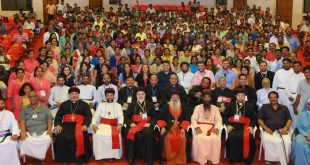An attempt to trace and preserve documents pertaining to St. Thomas Christians in Kerala received a boost when some ancient texts were digitized.
“This historic achievement would help establish the Syrian Christians link with Saint Thomas the Apostle,” said Metropolitan Mar Aprem Mooken of Church of East, a day after 180 rare documents were digitized. The metropolitan heads the St. Ephrem Ecumenical Research Institute in Kerala which has undertaken the project in collaboration with the state’s communist government and the Central European University in Budapest.
The project aims to catalogue and digitize the documents related to Christians who trace their faith to the apostle, Bishop Mooken said. It wants to find out the roots of religious practices among these Christians who are now scattered in many denominations, including the Catholic Church, the bishop said. These Christians believe the saint came to Kerala in 52 AD and preached the gospel before his death in neighboring Tamil Nadu state 20 years later.
The digitized documents were in Bishop Mooken’s possession. One of them was a facsimile edition of the canon law practiced by St. Thomas Christians. Its original had disappeared seven centuries ago, Bishop Mooken said.
Metropolitan Abdisho Bar Brikha of Nisibis and Armenia, a province of the Church of the East, compiled the canon in his own hand in 1291. Istva Prczel of the Budapest university edited the revived text.
Bishop Mooken, 70, said the research center has received another 200 documents from various sources that it plans to digitize soon. He said Syrian Christians lost vital clues about their culture and heritage when the Portuguese missioners burnt large volumes of their literature in 1599.
St. Thomas Christians had for centuries followed the Eastern rites and liturgy which brought them in conflict with the Portuguese missioners. The Portuguese wanted to ensure the dominance of Latin liturgy over St. Thomas Christians, he explained.
Another retrieved document is Kashkol, a breviary-prayer book, that “miraculously survived destruction by the Portuguese inquisitors,” the prelate said.
P.J. Cherian, who heads the Kerala Council of Historical Research, said the facsimile edition of religious texts of St. Thomas Christians is a “turning point” in history. Recent excavations in Kerala have found evidence of a port city that existed more than 2,000 years at a place where Saint Thomas is believed to have landed. Preserving the lost documents would shed new light on the cultural heritage of people of Kerala.
Source: ucanews.com
 Assyrian Church News Official News Site of the Holy Apostolic Catholic Assyrian Church of the East
Assyrian Church News Official News Site of the Holy Apostolic Catholic Assyrian Church of the East
